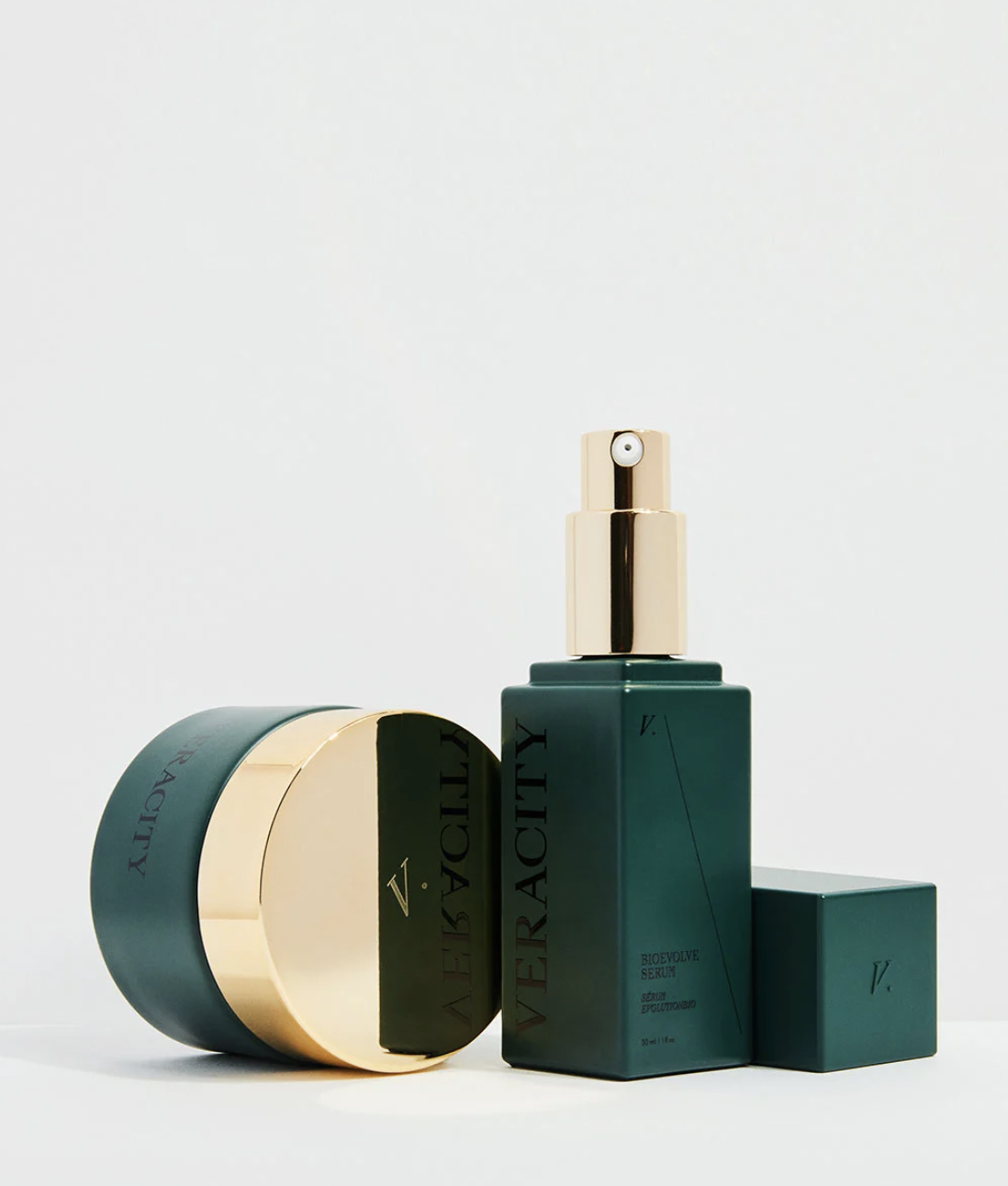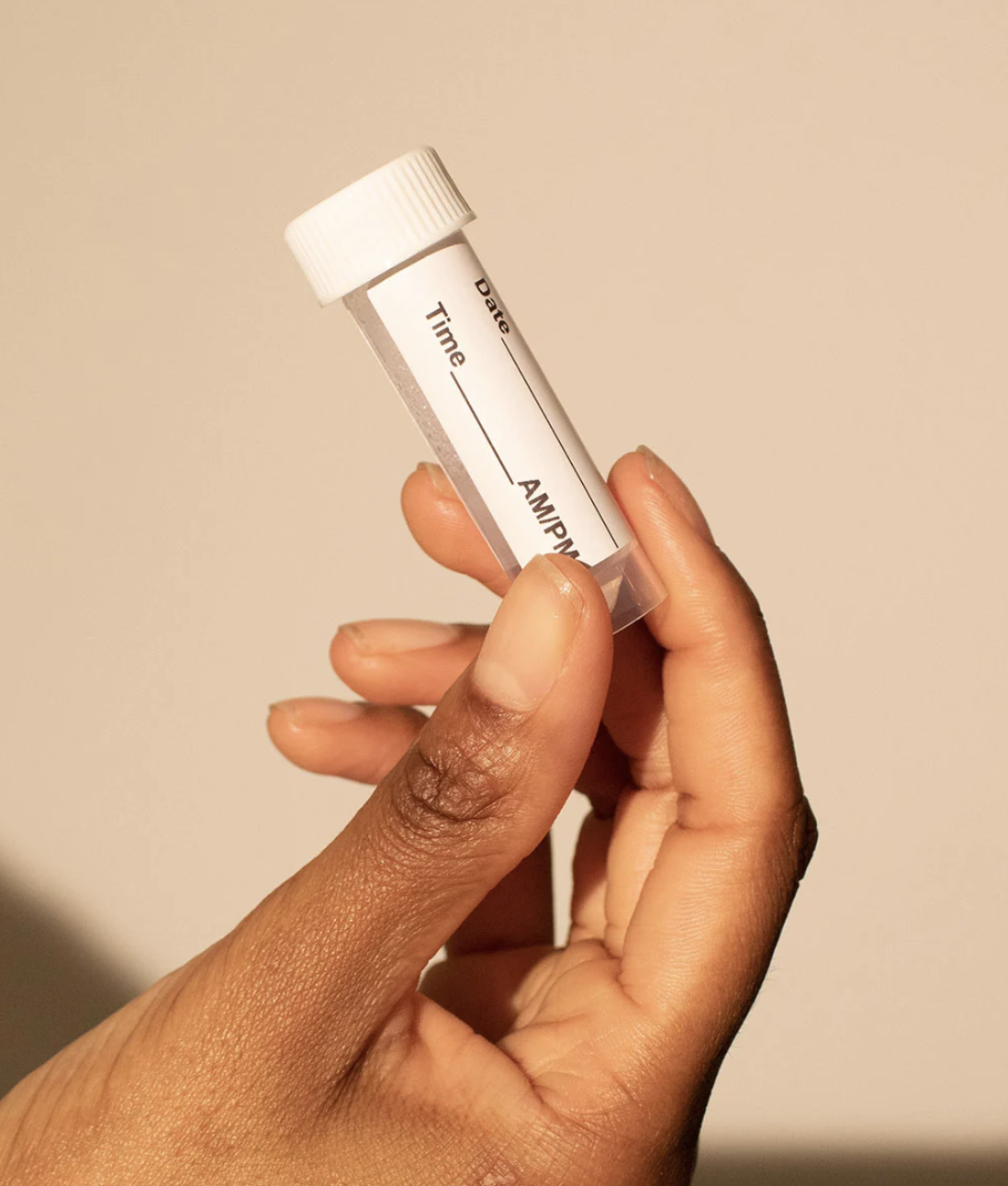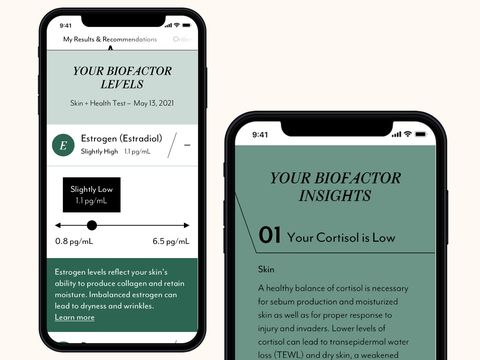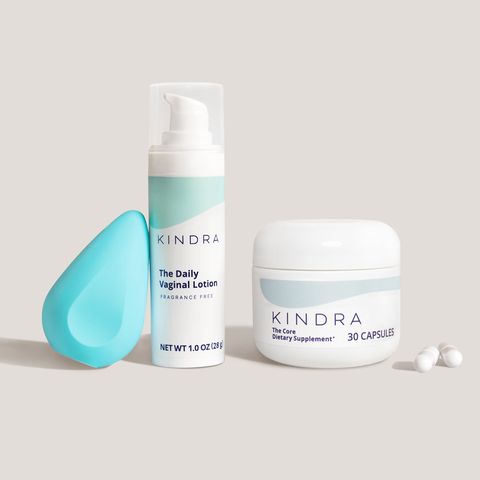You can fill your plate with salmon (like Victoria Beckham does) and buy the world’s greatest skincare products, but your skin’s health is a bit more complex than that. The way your skin looks and behaves is actually due to a fragile combination of lifestyle, genetic, and hormonal components. The latter has been the hardest of all to crack—until now. With hormones playing a role in oil production, skin sensitivity, acne breakouts, and more, it makes sense that hormone testing is shaping up to be beauty’s next big thing.
Veracity, the first skincare line based on unique biofactors, launched just last month and aims to make skincare science more personal with the first-ever skin and health saliva test that measures indicators like hormones and pH level. “We are used to thinking of skin changes as cosmetic—problems to fix with spot treatments and serums,” founder Allie Egan tells BAZAAR.com. “They’re actually a reflection of what’s going on inside and are sending important signals about our health.”
The brand was born out of Egan’s personal experience with hormonal imbalances, which she discovered after fertility-related hormone testing. “I think, like a lot of women, my skin was fine, and then something changed and I started to get these random dry patches,” she says. “I was Googling everything and saw my dermatologist multiple times, and both sources told me it’s just contact dermatitis.” The issue didn’t resolve for three and a half years until, at the fertility clinic, Egan discovered she had Hashimoto’s disease, an autoimmune condition that damages the thyroid gland.
Much like other areas of women’s health, hormonal imbalances can go largely undiagnosed and undiscussed. A survey of 2,000 women from 2019 found that nearly half of women have experienced the symptoms of a hormonal imbalance, but 72 percent of the respondents said that they weren’t aware their symptoms were related to hormone imbalances until after they experienced them.
Wanting to make hormonal testing more accessible to other women, Egan sees a future where the beauty industry is driven by “real health metrics.” After taking the skin and health test (by spitting in a tube at home), Veracity customers will gain personalized insights into their hormone levels and skincare recommendations, with explanations of the optimal ingredients to best balance long-term skin health. The products, however, in contrast to the personalized testing process, are not bespoke. Instead, there is a small selection of Vital Concentrates (potent blends of ingredients that target hormone-related ailments), a moisturizer, and a serum. Veracity also recommends diet, lifestyle, and supplements from an all-female team of medical advisers, with dermatology, endocrinology, OB-GYN, functional medicine, molecular and integrative physiology, and nutrition experts.
Vera David, a board-certified dermatologist at Good Dermatology, thinks that the future of medicine (and skincare) is in personalization. “I think personalized is the ideal; it’s just a matter of ensuring the uniformity of the products that are being created because the level of scrutiny that cosmeceuticals go through is not as strict as prescription medications,” she tells BAZAAR.com. “One day medicine will be super tailored—but we’re not there just yet.”
David says that dermatologists often conduct their own hormone testing in the office. “Hormones definitely play a role in acne, and they affect our skin in different ways in different age groups,” she says. “After teenage acne, most of the complaints come from women who are in their, like, late 30s, 40s, and then definitely in the, like, perimenopausal and postmenopausal stages, who are noticing their skin lacks luminosity, which is considered normal but is distressing.” David sometimes treats those patients with spironolactone, a drug used off-label to control androgen activity.
Hasti Nazem, head of operations at Kindra, a supplements brand for people going through menopause, says that when factoring hormonal levels into your skincare, it’s important to remember it comes down to managing your body for your stage of life. “Fluctuations in hormones are a completely normal part of life, but when hormones fall out of range, our skin may serve as a helpful barometer of these changes,” she says. “Thinking of the skin as a guide or mirror into what’s happening on the inside can be helpful.” If skin concerns persist, reach out to a medical professional for support since underlying hormonal shifts can be indicators of more than just skin issues.
These issues also don’t exclusively impact the face. “At Kindra, we focus on the intimate skin,” Nazem explains. “Often ignored but incredibly important, vaginal skin can feel extremely dry, thin, and inflamed as estrogen declines during the peri- to postmenopause journey, and can continue to fluctuate throughout the menopause transition with a marked overall decline.” Kindra has formulated an estrogen-free intimate lotion to boost hydration and rebuild the skin moisture barrier over time.
Beyond diagnostic testing, supplements, and tailored skincare, there is a number of natural ways to counteract the effects hormones play on our skin. For example, if cortisol levels (a catabolic hormone that breaks down tissues) are too high, it becomes destructive to collagen and can speed up the aging process. As the body’s main stress hormone, we can lower our cortisol levels through relaxation techniques, sleeping well, exercising, and upping our intake of fatty fish or fish oil.
There’s clearly a gap in the general understanding of how hormones can impact overall health and well-being, but whether the beauty industry should be leading the conversation is debatable. You don’t need entirely new products or an upgraded routine to address hormonal issues. Regardless, a shift toward hormone-centric skincare is already underway. The positive outcome being that talking about our hormones (with the fuel of our relentless search for glowing skin) is bound to increase education that will help both our mental and physical health.
Source: Read Full Article



